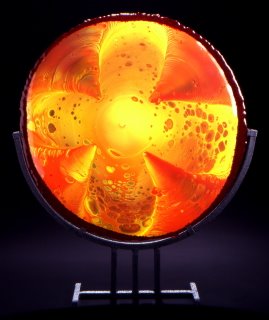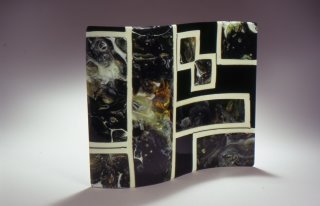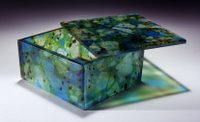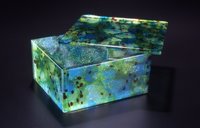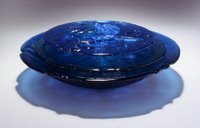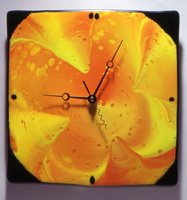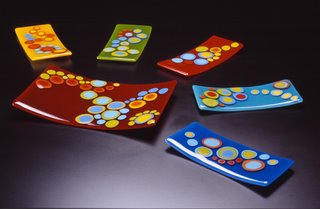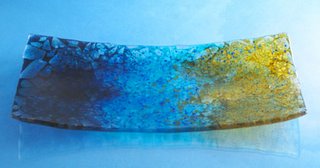This was going to be a post last night, but I left it to sleep. It has not gone away so it is the topic of the morning. I have a problem. I have finished about half of the book on kilnforming I have been contracted to write by a well-known publishing house. I am generally happy with what I have written. There is a lot of material, but I think I have organized it well and presented it in a way that will work for people coming to kilnforming from every degree of familiarity from complete neophyte to intermediate/advanced. The problem is that the feedback I got from my editor today is that I am not writing the book they want. They want me to just cover the tools and techniques necessary to make the projects in the book--and all the projects in the book are limited by kiln size--not everything I would like to share after 20 years of kilnforming. In short, they would like a pretty, fluffy little project book. Being from an academic background and infused with the sense that anything worth doing is worth doing well, I am having trouble adjusting to this... lighter... vision.
One of the problems I am having is that I just don't see someone going to Barnes & Noble, seeing this book on the shelf and saying, "Ooh, I think I'll buy this book, go spend $500 on a kiln and another $300-$400 on miscellaneous tools and learn to fuse glass!" It seems more likely to me that the people who buy this book will have already taken a class, or have a friend who kilnforms who will share their kiln or something. Unlike mosaic work where I can go out and buy a few tools and I am ready to rock, the equipment needed for kilnforming is expensive and daunting.
But the main thing going on here is ego, plain and simple. I've had a night to reflect and my backbrain has beaten my forebrain into submission and I have to admit it. When I started this process I was asked by the publisher if I wanted to include pictures of the work of other artists in the book. Heck yeah, I said. As deadlines even then were short, I approached the first 30 that I could think of. These were people I had met over the years or whose websites I had seen, and all of whose work I had admired. It was an eclectic mix, and I was not concerned with things like, did this person "originate" this technique, or who did they learn from, or were there other people I might be unintentionally snubbing by not asking them. All of those conditions are always going to be true in any small list. Unfortunately, my list, as they say in Mission Impossible (and how appropriate is THAT connection) got out in the open. Not too open, but open enough that there was a small bit of furor and flack in my small community. I don't know how much, but the fact that I know at all means it was not inconsiderable.
So where am I going with all this history? Well it is a two-parter. First, when I approached the other artists I indicated I was writing a primer on kilnforming. I gave the size and layout guidelines. There would be a Basics section--materials, tools, techniques, work-area set-up and safety--and a Projects section with 20 projects ranging from beginner to advanced. This is all well and fine. But there is (in my mind at least) a major difference between a "primer" and a "fluffy, pretty, little project book". What are the other artists going to think? Are they just going to be happy to have images of their work in print? Or are they going to be offended to be associated with "fluff"? And I hope you know what I mean by "fluff": It looks great, but when you really delve into it there isn't all that much of substance, and there is certainly no "this probably will be difficult and frustrating, but persevere because it is worth the effort". I haven't been told specifically NOT to put that kind of info in, but I feel herded in that direction.
So that's the first part. The second part comes from a bit of the reaction I DID get on working with this publisher from other members of our geographically diverse, but pretty tight on-line community. (I am a member of warmglass.com. I post and read infrequently, but intensely.) Another book that came out a couple of years ago just got RIPPED on the list (and on amazon.com in the reviews section) because the title the publisher selected when they translated the work was very similar to a well-loved book written by another member of the list. It wasn't even the author's fault but she and the book just got trashed. I don't know if I am thick-skinned enough to deal with deserved literary (technical) criticism from an honest effort. If I have to write fluff...
So as I write, I have someone who has already disapprovingly declined to participate in my effort virtually perched on my shoulder reading everything I type. From his whispers in my ear, I constantly check myself to make sure what I write is both complete and accurate. This kind of writing for a specific audience (notice it is NOT the publisher's target audience for the book) is keeping me honest and true and not giving me any slack for laziness, and I think it is making the book better than it otherwise would have been, better than it needs to be.
And there is the crux of the matter. I am writing a book that is better than it needs to be. It is taking a huge toll on me emotionally, mentally, and even physically. And it is not financially responsible from the publisher's point of view. They are in business. They don't care about ego. They care about sales, profits, bottom-line. They don't give a rat's ass about esoterica (which after 20 years I have a lot of). They want a book which will appeal to the great unwashed masses. They want me to be the Bob Villa of glass earnestly helping people make simple little things and feel like they are Really Fusing Glass, even if they are just using the same technique over and over again in their little 14" kilns.
So I don't know if it is good or bad that the publishers do not seem to get how truly advanced some of the projects are and how each and every one teaches a new technique. I didn't go for eye-candy. I went for by the time you have done every project in this book you will have tried most of the different kilnforming techniques (although I am light on painting so far). Is that bad? I don't know. Will it flop? I truly have no idea. Maybe I really can't present some of the higher level stuff because I won't have the space to go into all the could-go-wrongs and the what-to-do-with-the-went-wrongs.
What's in other books out there on kilnforming? I honestly don't know. Sure, I have most of them (buying books is a sickness with me--I also have a lot of books on metallurgy). But I only glanced through them when I got them and that was it. By the time anything more recent than Glass Fusing Books 1-3 by Boyce Lundstrom et al came out, I was already comfortable with the hows of kilnforming and I had plenty of ideas of my own so I wasn't interested in the projects. Shar Moorman's book was interesting and had some stuff I remember wanting to try, but I was too lazy to make the conversions from Celsius to Fahrenheit (at least that's how I remember it). So should I look now? Should I try to change course and give the publisher something kinder and gentler--like fool-proof projects? Or should I just keep forging my own path, writing what I need to write, and teaching the projects that will be challenging and not always come out perfectly the first time?
Whatever I decide, I have to do it now. Today is a writing day. The big one for the week. Comments really appreciated on this one.
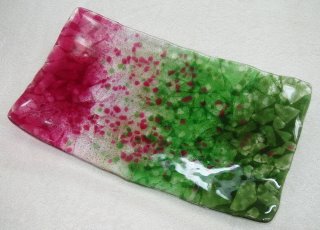 Coffee in the Atlanta skyline mug, "For You" by the Barenaked Ladies on iTunes, 500 unscheduled just-for-the-hell-of-it words written yesterday in addition to an almost complete detailed shot list.
Coffee in the Atlanta skyline mug, "For You" by the Barenaked Ladies on iTunes, 500 unscheduled just-for-the-hell-of-it words written yesterday in addition to an almost complete detailed shot list.







